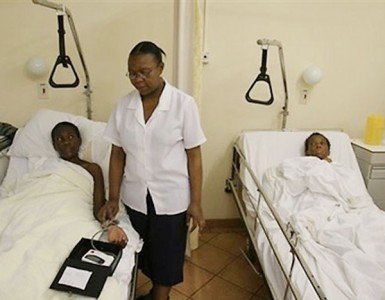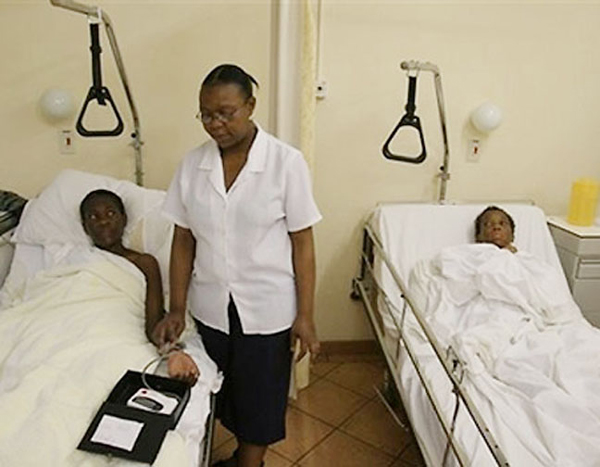– Edwin Cameron is a Justice of South Africa’s Supreme Court of Appeal.
By Edwin Cameron
JOHANNESBURG – “If the law supposes that,” Mr. Bumble says in Charles Dickens’ novel Oliver Twist, “the law is an ass.” A criminal law that makes it preferable for carriers of HIV not to know that they are infected and capable of spreading it to others, including their loved ones, seems particularly suited to Mr. Bumble’s condemnation.

Yet tragically, in a misguided attempt to thwart the spread of HIV and AIDS, lawmakers in many parts of the world have passed criminal statues that promote ignorance about the disease, punish its victims, and enhance the chances that the virus will infect new victims. Some countries in Western and Central Africa are enacting poorly drafted policies based on the African Model Law, which makes it a criminal offense for any person infected by the virus to transmit it to someone else or to expose another person to it. In some jurisdictions, prosecutors can bring charges against pregnant women who are HIV-positive for potentially exposing the virus to their unborn children.
There are, to be sure, rare and dramatic cases in which a person with HIV infects another with the specific intention of inflicting harm. It is a reality that men infected with HIV or AIDS in some parts of Africa have even raped girls believing that sex with virgins is a cure. And some women’s rights advocates have supported laws that criminalize transmitting HIV, arguing that these laws would punish men who concealed their HIV-positive status from their sexual partners, including their wives and girlfriends. But existing criminal laws are more than adequate to allow willing justice systems to mete out appropriate sanctions against people who intend harm.

Criminal laws targeting all HIV carriers, however, are counter-productive and inherently unjust. These laws effectively make criminals out of millions of the disease’s innocent victims, especially its women victims. In Zimbabwe, for example, a woman was recently sentenced for exposing her lover to HIV even though she did not infect him. In Ukraine, human rights lawyers report the troubling case of a woman who was convicted for transmitting HIV to her husband even though he had used a condom, and despite the fact that he asked for the charges to be withdrawn.
Gender bias against women permeates throughout Africa, and women are usually blamed for bringing HIV into a relationship. This popular misconception springs, at least in part, from the fact that women are more likely to know their HIV status because they are routinely tested for HIV at maternity clinics when they seek pregnancy tests or examinations.
Most men on the other hand—deterred by fear, ignorance, pride, and, sometimes, taboo—refuse to be tested voluntarily. This skews the outcomes of legal cases because the lack of testing of men makes it nearly impossible for a woman infected with HIV to establish before a court of law that her male sex partner infected her.
Laws criminalizing the transmission of HIV undermine public health because they deter people who are HIV-positive and those at risk of acquiring the virus from seeking testing, counselling, and treatment. When persons face the possibility of criminal sanctions, not knowing their HIV status can be their most-effective legal defence. Prosecutions will act to deter many people—especially men as well as persons living in areas where HIV treatment is largely unavailable—from being tested because it would expose them to the risk of criminal liability.
Such laws also transform HIV victims into scapegoats for a societal problem for which the governments and broader societies are failing to undertake effective, and sometimes politically or culturally risky, steps that can defeat the disease. Sadly, these “risky” steps include things as rudimentary as open discussion of the disease, education, and encouraging people, and especially men, to undergo testing.
AIDS has claimed more than 25 million lives since medical scientists first identified it in 1981. New infections continue to outpace treatment efforts. Basic precautionary options such as HIV testing, male and female condoms, and sterile syringes for drug injection remain out of reach for the vast majority of those who need them.
This woeful situation demands effective action and not more victims and scapegoats.
Open, informed discussion of the HIV epidemic, education into HIV prevention, distribution of condoms, and other strategies are the only known way of preventing new infections. The vulnerability of women to HIV should be addressed by protecting their equal right to marital property, enforcing laws against gender-based violence, including rape in marriage, and empowering them to negotiate safer sex with men.
Copyright: Project Syndicate, 2008.
www.project-syndicate.org

